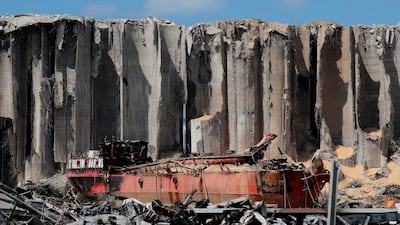Import and export activities at Beirut port have fully recovered from the deadly blast on August 4 that killed more than 180 people and destroyed its giant grain silos, the newly appointed director of Beirut port Bassem Al Qaisi told The National on Wednesday.
“We are in operation 100 per cent. By this, I mean loading and unloading containers and the import and export of containers and general cargo,” he said.
But storage capacity is only at 40 per cent of what it was before the explosion, which completely destroyed the port’s warehouses, said Mr Al Qaisi. Another year is needed for the storage area to be fully operational again.
“The reason that it will take a year is that there is a lot of foreign aid and donations which will take some time. We also have to hire contractors to build warehouses and launch tenders,” he said.
“We are really focusing on putting the port back on its feet because there is a lot of damage on the logistics buildings in the free zone and in administrative buildings. There are no warehouses for dry goods. We need a fire station and a water tank. Such issues take time,” he said.
A former member of the port’s board of directors, Mr Al Qaisi was appointed for six months on August 11 after his predecessor was arrested as part of an investigation into the blast.
Smashed cars and imported goods, including clothes, salt and perfumes, are still strewn on the ground a few hundred metres from the explosion site. Since August 14, the Lebanese army has received support from the French military to clear the zone.
“We cleared 8,000 tonnes of debris in the past five days. That’s the equivalent of the Eiffel Tower,” Lieutenant Paulin, a French officer co-ordinating clearing operations at the port, said on Wednesday.
“Our objective is that in four days, there are no more warehouses,” he said.
The Tonnerre, a French amphibious helicopter carrier, arrived in Beirut recently with dozens of trucks and heavy machinery to clear the debris.
The blast, one of the largest in recent history, levelled entire sectors of the port, created a 43-metre-deep crater that was covered by the sea, and sent a shockwave that damaged property and injured people several miles away.
Beirut port unloaded 78,000 tonnes of grain, flour, wheat and corn between August 11 and August 23, said Mr Al Qaisi. “The government is focusing on food security,” he said.
Custom figures show that 75 per cent of Lebanese imports transit through Beirut port.
“Nobody expected that after 72 hours, Beirut would receive containers, and general cargo, and loading and unloading. We were able to put the port back on its feet because the great Lebanese army helped us clean the keys and sites and gave us all the support needed. In parallel, we repaired a lot of equipment, including mobiles cranes,” said Mr Al Qaisi.


